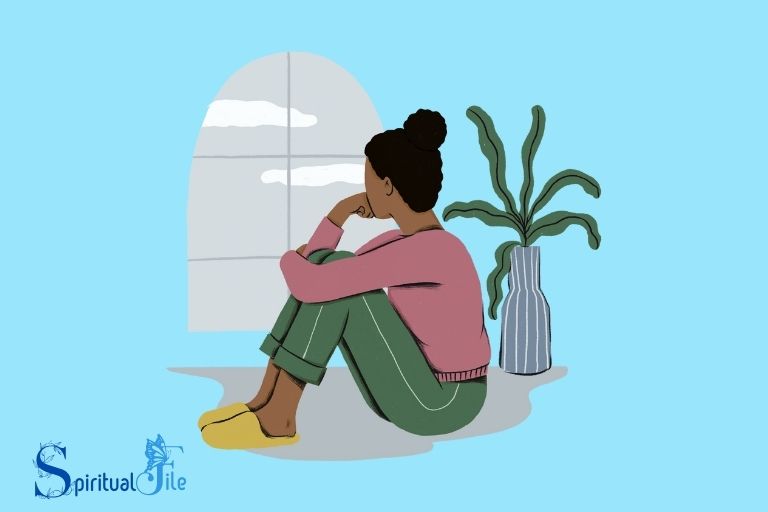Examples of Spiritual Pain: Loss of Faith!
Spiritual pain is a type of suffering that affects an individual’s inner self or spirit.
Examples of spiritual pain include feelings of emptiness or lack of meaning in life, a loss of faith, questioning or doubting one’s beliefs, or feeling abandoned by one’s religious community.
Spiritual pain is a complex and multidimensional phenomenon that is deeply personal and subjective.
It arises when an individual’s deeply held beliefs, values, or connections to a higher power or the universe are disrupted or threatened. It can often occur alongside physical or emotional pain, and sometimes, it may even be the root cause of such suffering.

Key Takeaway
8 Spiritual Pain Examples
| Spiritual Pain | Description |
|---|---|
| Meaninglessness | The sense of not having a purpose in life, or not knowing one’s purpose. This can lead to a deep existential crisis and distress. |
| Guilt | Feeling of remorse or regret for past actions or inactions that goes against one’s spiritual beliefs or values. |
| Anger with God | Anger or resentment towards a divine entity or higher power. This can stem from a feeling of abandonment or misunderstanding. |
| Moral Distress | This type of spiritual pain may be experienced when individuals feel they are unable to live according to their personal values or ethical principles, which can result in a feeling of regret or self-disappointment. |
| Desolation | The sense of being utterly alone, even in the presence of others or a divine power. |
| Hopelessness | Similar to desolation, this is the feeling that no matter what one does, things will not get better. |
| Fear of Death | The anxiety stemming from the anticipation of one’s own mortality. This is often tied to beliefs about what happens after death. |
| Grief | An emotional response to loss, particularly to the loss of someone or something that has died, to which a bond was formed. This can be particularly acute when one’s spiritual beliefs challenge the acceptance of loss. |
Understanding Spiritual Pain
Spiritual pain is a deeply personal and intricate facet of human experience, extending beyond the physical and emotional realms to affect an individual’s sense of meaning, purpose, and inner well-being.
Defining Spiritual Pain
Spiritual pain is distress related to one’s spiritual or existential aspects, unlike tangible physical or emotional pain. It’s rooted in questions about life’s purpose, the existence of a higher power, and one’s inner well-being.
It often arises from feelings of disconnection, doubt, or existential crises, distinguishing it from physical or emotional pain.
The Complex Nature of Spiritual Pain
Spiritual pain is highly individual and complex, making it challenging to define or diagnose precisely. It may manifest differently in each person, depending on their unique beliefs, values, and experiences.
Some common elements that contribute to the complexity of spiritual pain include:
- Diverse Belief Systems: People adhere to various religious, spiritual, or philosophical belief systems, each of which can influence their experience of spiritual pain differently. For some, conflicts between their beliefs and life experiences can lead to anguish.
- Existential Questions: Spiritual pain often arises when individuals confront existential questions without clear answers. These questions may involve the nature of suffering, the existence of evil, or the purpose of life, leading to a sense of profound uncertainty.
- Crisis Points: Life events such as loss, trauma, or major transitions can trigger spiritual pain as individuals grapple with the meaning of these experiences. They may question the fairness of life or the existence of a benevolent force in the universe.
- Connection to Emotional Well-Being: Spiritual pain can significantly impact emotional well-being. Feelings of despair, hopelessness, or existential despair may accompany it, further complicating the emotional landscape.
Manifestations of Spiritual Pain
Spiritual pain can manifest in a variety of ways, often with subtle and nuanced indicators.
Some of the common manifestations include:
- Loss of Purpose: Individuals experiencing spiritual pain may feel a profound loss of purpose in their lives. They may question the significance of their actions and struggle to find meaning in their daily routines.
- Doubt and Confusion: Doubt about one’s beliefs or the existence of a higher power can lead to inner turmoil. This doubt may result in a sense of spiritual crisis.
- Social Isolation: Spiritual pain can contribute to feelings of isolation, as individuals may find it challenging to relate to others who do not share their beliefs or struggles.
- Moral Distress: Moral conflicts rooted in spiritual beliefs can also cause spiritual pain. Individuals may grapple with ethical dilemmas that challenge their sense of right and wrong.
- Seeking Meaning: Paradoxically, spiritual pain can also drive individuals to seek deeper meaning and purpose in their lives. It can serve as a catalyst for introspection and spiritual growth.
Experiencing Loss Of Meaning And Purpose
A loss of meaning and purpose can cause spiritual pain, manifesting as disconnection from values, difficulty finding fulfillment, or questioning life’s significance.
Life’s challenges and existential crises can worsen this pain, impacting spiritual well-being. Let’s delve into how these factors contribute to spiritual pain by exploring their effects on meaning and purpose.
Exploring How Spiritual Pain Can Lead To A Loss Of Meaning And Purpose In Life:
Feeling disconnected: Spiritual pain often arises when individuals feel a sense of disconnect from their beliefs, values, or a higher power. This disconnection can leave them questioning the purpose and meaning of their existence.
Lack of direction: When faced with spiritual pain, individuals may struggle to find a sense of direction or purpose in their lives. The inability to determine one’s path can result in a feeling of lost meaning, where life may seem to lack a greater purpose.
Questioning beliefs: Spiritual pain can emerge when individuals start to question their beliefs or experience doubts about the principles that have guided them in life. This internal conflict can lead to a sense of confusion and the loss of a clear sense of purpose.
Loss of hope: Spiritual pain often involves a loss of hope or optimism about the future. When individuals feel disconnected or lack direction, their hope for a meaningful and purposeful life diminishes, contributing to feelings of despair and emptiness.
Existential crises: Existential crises, such as confronting mortality or confronting the impermanence of life, can trigger spiritual pain and a loss of meaning and purpose.
These experiences force individuals to question their existence, leaving them grappling with the fundamental aspects of life itself.
Struggling to find significance: Spiritual pain can arise when individuals struggle to find significance in their daily activities and experiences.
Without a sense of purpose or meaning, life may feel mundane, leading to a deep longing for something more profound.
Experiencing a loss of meaning and purpose in life is a complex facet of spiritual pain.
Whether it stems from feeling disconnected, lacking direction, questioning beliefs, losing hope, encountering existential crises, or struggling to find significance, addressing .
These challenges is crucial for individuals to cultivate spiritual well-being and regain a sense of purpose and meaning in their lives.
Moral and Ethical Spiritual Pain
Moral and ethical spiritual distress is a profound facet of the human condition, frequently accompanied by inner turmoil as individuals contend with moral quandaries and ethical conflicts.
This internal conflict can manifest in diverse manners, impacting one’s mental and emotional welfare.
The Whistleblower’s Dilemma
Imagine working as an employee at a prominent corporation, stumbling upon undeniable evidence of widespread fraud and corruption within the organization.
You find yourself torn between two challenging choices: reporting the misconduct and risking your job, reputation, and even personal safety, or opting to turn a blind eye and grapple with the guilt of tolerating unethical behavior.
A real-life example of this moral and ethical dilemma is Jeffrey Wigand, a former executive at a major tobacco company. He exposed the industry’s unethical practices, especially concerning the dangers of smoking.
His decision to blow the whistle on the industry had substantial personal consequences, including threats to his safety and significant damage to his career and reputation.
The Healthcare Provider’s Conundrum
Healthcare professionals frequently encounter morally and ethically challenging scenarios. Take, for instance, a physician faced with the decision of whether to administer aggressive treatment to a terminally ill patient, potentially extending their suffering.
This ethical conflict, balancing life extension and preserving the quality of life, can be emotionally excruciating.
Dr. Jack Kevorkian, famously known as “Dr. Death,” brought this dilemma into the spotlight by aiding terminally ill patients in ending their lives.
His actions triggered a passionate debate regarding the ethics of physician-assisted suicide and the moral obligations of healthcare providers.
Environmental Ethics and Personal Choices
In an era of environmental consciousness, individuals often experience moral and ethical spiritual pain when making everyday choices.
One such dilemma is the decision to reduce one’s carbon footprint by adopting a more sustainable lifestyle. People may struggle with the tension between personal convenience and the moral responsibility to protect the planet.
The Tech Industry’s Moral Quandary
In the tech industry, ethical dilemmas are widespread, particularly when it comes to concerns such as data privacy and the advancement of AI technology.
Software engineers and developers frequently encounter a moral quandary, torn between their obligation to develop groundbreaking products and their moral responsibility to ensure that these technologies do not cause harm to society.
A prominent instance of this can be seen in the case of Cambridge Analytica, a company that illicitly harvested Facebook user data to influence political campaigns without user consent.
Employees who became aware of these unethical practices found themselves in a moral crisis, having to decide whether to expose the wrongdoing or remain silent and complicit.
Conclusion
Spiritual pain is a deeply personal and often hidden aspect of human experience. It can manifest in many different ways, impacting our emotional, mental, and physical well-being.
Through the examples explored in this blog post, we have gained insight into the various forms that spiritual pain can take.
From the loss of faith and existential crises to the feeling of disconnection and the search for meaning, these examples shed light on the complex nature of our spiritual journeys.
It is crucial to acknowledge and address spiritual pain, as it has the potential to affect every aspect of our lives.
By recognizing the signs and symptoms, seeking support from loved ones and professionals, and engaging in self-care practices, we can begin to heal and find solace amidst our spiritual struggles.
Remember, you are not alone in your spiritual pain, and there is always hope for growth and transformation.






